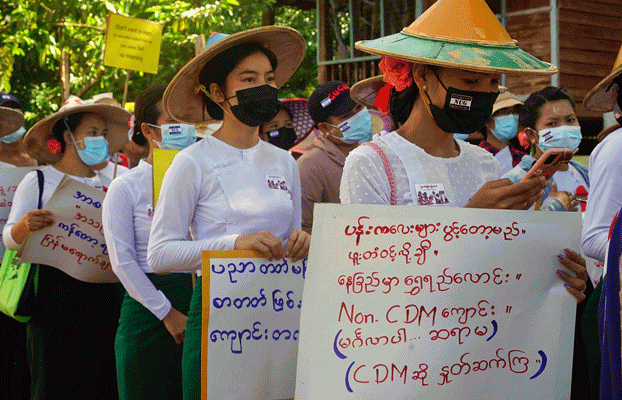Chinese company faces hefty bill to quarantine 300 North Korean workers
A clothing company in China must pay U.S. $1,500 to quarantine each of its 300 North Korean workers after some of them tested positive for COVID-19, sources in China told RFA. Some Chinese employees at the factory in Dandong, which lies across the Yalu River from North Korea, also tested positive for the virus. All of them went into quarantine last week, but the high cost of isolating foreign workers means the company will have to shell out $450,000 to quarantine the North Koreans. “The news that the Chinese president of the company that hired the 300 North Koreans must pay for their treatment is disturbing to the other companies that use North Korean labor,” a Chinese citizen of Korean descent, who requested anonymity for security reasons, told RFA’s Korean Service. “The Chinese government has decided that the quarantine cost for foreigners is 10,000 yuan (about $1,500) per person. The head of the company may incur an irrecoverable debt from the quarantine costs alone,” the source said. North Korea sends workers overseas to places like China and Russia to earn desperately needed foreign cash. The workers must give the lion’s share of their salaries to their government, but what they get to keep is far more than what they could earn in a similar job at home. Most of the North Korean workers in the factory are female, according to the source. “The quarantine command in Dandong … rushed all the workers to the hospital facility on a large bus,” the source said. The clothing company is not the first to have to quarantine its North Korean workers, according to the source. “In May, there were 20 North Koreans who worked for another company in Dandong and were placed in quarantine when they showed symptoms of COVID-19. In that case, they were quarantined in the company’s dormitory because there was no room in the hospital due to the outbreak spreading through Dandong,” he said. The company with the 300 North Koreans originally produced clothes, but switched to making COVID-19 protective clothing, he said. “The 300 North Korean workers wore the protective clothing [that they made] while they worked, but they still failed to prevent their own infection,” said the source. A North Korean source living in the port of Donggang, within the city limits of Dandong, told RFA that owners of companies who hire North Korean workers are getting nervous after hearing about the 300 quarantined North Koreans. “North Korean workers who are known to be infected with COVID-19 were transferred to the quarantine facility by several large buses,” the second source said on condition of anonymity to speak freely. “Most Dandong residents go to a hospital in Shenyang or Dalian when they get COVID-19, so it is likely the North Koreans are there,” he said. Dandong is a three-hour drive from Shenyang and a three-and-a-half-hour drive from Dalian. Confirming their whereabouts could be difficult, however. “Although the Dandong city government has lifted the COVID-19 lockdown, it has not yet guaranteed complete autonomous movement. There is therefore no way to know exactly where the North Korean workers have gone unless you’re somehow involved,” he said. According to RFA sources, about 30,000 North Korean workers are believed to be in the Dandong area. North Korean labor exports were supposed to have stopped when United Nations nuclear sanctions froze the issuance of work visas and mandated the repatriation of North Korean nationals working abroad by the end of 2019. But Pyongyang sometimes dispatches workers to China and Russia on short-term student or visitor visas to get around sanctions. Translated by Claire Shinyoung O. Lee and Leejin J. Chung. Written in English by Eugene Whong.



